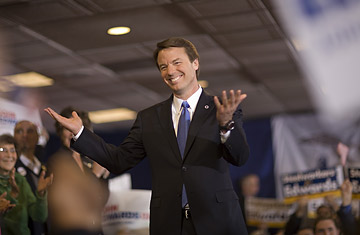
John Edwards claims second place in the Iowa caucuses in front of supporters on Thursday, January 3, 2007.
John Edwards went into the Iowa caucuses last night a fighter and he emerges from them as scrappy as ever. In other words, don't assume, because he lost to Barack Obama, that Edwards is down for the count. After all, as his campaign advisers are quick to point out, by finishing second Edwards's David can claim victory over at least one Goliath. "The person hurt in all this is Hillary Clinton," Joe Trippi, an Edwards senior advisor, told TIME minutes after his candidate claimed the silver medal in Des Moines. "The former President of the United States flew all around this state and so did she. They outspent us three-to-one at least. And we beat her."
Beat, yes. But barely. Edwards eked out a second place showing in the Iowa caucuses with 29.75% of the vote, trailing well behind Obama's 37.58%. Clinton, the New York Senator and former first lady who for months wore her party's front-runner mantle, placed a surprise third behind Edwards by the narrowst of margins, pulling in 29.47%.
The former North Carolina Senator, whose strong second place in Iowa in the 2004 caucuses helped him win the South Carolina primary that year and earn a spot on the ticket as John Kerry's running mate, claimed last night's results were a victory for both him and Obama, since each ran as agents of change in contrast to Clinton, the establishment candidate. "The one thing that's clear tonight in Iowa is that the status quo lost and change won," Edwards declared, noticeably not congratulating Obama for his victory. "You have created and started a wave of change, a tidal wave of change that will travel from here to New Hampshire to South Carolina to Nevada and all across this country."
All that's now left to decide, said Jonathan Prince, Edwards' top strategist, is what kind of change the country wants. "Are we going to have a philosophical version of change, or are we going to have a fight to bring about the change we really need?" Prince asked in a rhetorical flourish meant to contrast philosophical change (Obama) with the real thing (Edwards). Edwards' populist message has focused on stamping out the power of corporate greed in Washington, and he argues that Obama's "Kumbaya" inclusiveness cannot get that job done. "Asking lobbyists to simply give up their power by asking them? In whose world? Not in the real world. That is a complete and total fantasy, it'll never happen," Edwards told a crowd in Ames Tuesday.
Just as he did in this cycle, Edwards invested heavily in Iowa in 2004. But he didn't have the resources and hadn't spent the time there to fare well in New Hampshire, where he placed fourth. Edwards raised $1 million a day after his surprise second place in Iowa that year, largely because, with Howard Dean swooning, Edwards came across as that year's only fresh-faced agent for change. But Democrats are living in an altered universe this time: if the Iowa results tell us anything, it is that Obama, far more than Edwards, has won the change mantle. And while Obama has already raised more than $100 million, Edwards has collected only a third as much. His relative shortage of funds forced him to accept public financing with its $50 million national spending limit in the primaries, a restriction that could severely limit his ability to compete with Obama and Clinton going forward. The problem is not just national; there are state-by-state spending limits for candidates taking federal matching funds. That means that in New Hamsphire, Edwards will be able to spend just $818,000 for the primary.
His aides, though, argue that his victory over Clinton, who has also raised over $100 million, shows his message is resonating despite his comparatively thin wallet. In Iowa he was limited to spending $1.5 million, though he benefited from spending by supportive unions and privately funded outside groups that ran television commercials on his behalf. "I have to be honest, I didn't think with a turnout of more than 200,000 that we'd be where we are in this thing," Trippi said. "We only had 42,000 hard count [i.e., committed voters], so to go from 42,000 to 65,000 or 70,000 — the message had to have been so strong that people got up out of their homes and went to a caucus without the campaign getting them there. Now the campaign that everyone thought was going to happen to or knew that was going to happen to was the Obama campaign, but it turns out that there were two of those campaigns." To be sure, Trippi was spinning the best possible story for his candidate. But it is certainly true that a large turnout was expected, by many observers, to do more damage to Edwards' chances than to Clinton's.
Even as Edwards was speaking last night, member states of the Service Employees International Union that have endorsed Edwards were sending out a press release claiming victory out of second place and laying out their strategy to work for him in the upcoming contests. And you can be sure the same outside groups that helped Edwards in Iowa will appear in New Hampshire. Still, the tidal wave that Edwards' spoke of, at least for tonight, is not his own. It will take another tidal wave for Edwards to wrest the mantle of change — and a victory — from Obama.
